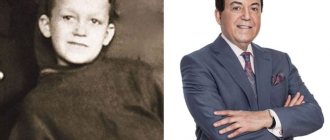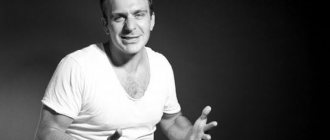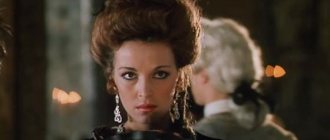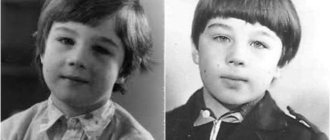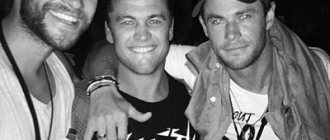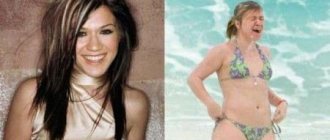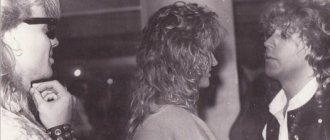Blatnoy in headwear
Shirt, tie, formal suit. And underneath it all are blue tattoos! There were several of them on Kobzon’s body, the largest being the eagle on his shoulder. The first tattoos appeared in adolescence. “Only weak” with the boys in the village where he was vacationing in the summer.
“I hid my left hand from my mother when I returned. On the fingers were the initials of mine and my closest friends Volodya and Leni. On another finger there is a ring. On the shoulder - “I will not forget my own mother.”
And then one day my mother finally discovered my tattoos. She hit me with a broom! And when I grew up and started performing, I became uncomfortable in front of the audience. He appeared, for example, on the beach - everyone ran to look at the thieves Kobzon. I went and removed all the tattoos.
One day I came home, undressed, took a shower, and came out naked. And my mother saw that there was no tattoo “I will not forget my dear mother.” She was upset: “Well, son, have you stopped loving your mother?”
FAMOUS WIG
Joseph Kobzon's receding hairline appeared very early. His mother believed that this was because stubborn Yosya, as a child, walked without a hat in 40-degree frost.
By the age of 35, the singer’s hair had noticeably thinned, and the skin on the sides of his forehead and on the top of his head began to show through. It was then that Kobzon put on a wig for the first time. Since then, he has never appeared in public in his “natural” form.
Joseph Davydovich had a lot of wigs, but they were all sewn like a cap, which did not hold on very tightly and often tended to slide to one side. Having found himself in an absurd situation several times, Kobzon began to use special glue that held the “hair” in place.
No, you are not Statham, rather Kobzon. The story of one baldness
Men have their own troubles. The main one, perhaps, is hair loss. Not weight, not the quality of teeth, and not at all the size of the penis, which is what manufacturers of ointments and pumps insist on - all this is nonsense.
Only the most narrow-minded and uneducated individual will grieve about the size of the penis. If you think about it, what difference does it make to a man? It works fine - and okay, its size has absolutely no meaning for the owner, we don’t wear it on the forehead for everyone to see.
Don't shout about his true size - no one will know (and this trick doesn't work with boobs). You can always lose excess weight and build muscle. And even if a man never gets around to going in for sports, the theoretical possibility itself consoles and reconciles - I’ll start tomorrow, just think. What else does a man need if not consolation?
The situation with hair is fundamentally different: it never comes back.
It gets to the point where the hairy beggar looks down on the bald millionaire. It is impossible to understand, difficult to accept, and this is one of the paradoxes of the male consciousness: hair is a value in itself. The fact of having a natural hairstyle acquires enormous weight, sometimes influencing everyday philosophy. Is this why a bald man has to work twice as hard in order to compensate for his baldness with success in other areas? A man with hair will most likely wave his hand - just think, girls love him anyway. This is why I tend to view my alopecia as a positive factor: who knows how happy I would be and what I would be doing if I still had my curls. This somewhat reconciles me with my trauma.
Do you think baldness is nothing special, a trifle, an everyday matter? Let me tell you.
A man who loses his hair experiences the same internal transformations as a dying man. Remember - denial, anger, bargaining, depression and acceptance? Women experience the same thing when parting with beauty, only for them the process takes their whole life, and it’s terrible.
The realization that sooner or later the hair will leave the head hits a man like a lightning strike: instantly, mercilessly, witheringly. This can be told by a stupid hairdresser, with two brains equal to the number of blades of her scissors, or by an idiot I know, or by a cruel mirror in the fitting room of an atelier, as happened to me. My lips trembled, my shoulders sank, and fear squeezed my heart. I came home and looked at the back of my head in a hand mirror for a long time, trying to somehow put the tragedy into my head and correct the shaken world around me.
After that fateful day, I suddenly found an explanation for some of the facts that were stored in my memory. Every single one of my male ancestors was bald, like Marcellus Wallace. I remembered a blue bottle with a picture of a curly head and the inscription Karmasin and Dad, who rubbed the contents into his scalp, refusing to reveal the purpose of the potion. Karma and Sin - what a cruel irony, isn't it? The lotion smelled so pungent and cloying that I remembered this amber for sure. Here it is, the smell of struggle and despair.
One day the time came for me to go on the road of sorrow and shame - try to throw a stone, whoever is without sin. This is the chronicle of my fall.
At first I convinced myself that “it’s not noticeable yet.” Either he avoided mirrors like an old syphilitic, or he felt a painful desire to check the top of his head. I smeared my hair with a mixture of egg yolk, onion juice and honey - this stuff flowed into my eyes and down my collar, because I had to wear it for an hour.
I felt like an omelette and gave off a corresponding smell. I treated my head with a massage brush to cause blood flow to the follicles. I constantly came across commercials for some miraculous laser gadgets that supposedly return hair to its place. The happy advertising actor made you want to kill him on the spot for his idiotic facial expression.
All sorts of shamelessness was broadcast on TV: some old farts from England would expose their bald heads to cow tongues - and pale fluff would appear on their skulls after just two weeks of licking! Pre-registration was even opened for an appointment with the magic cow. The last episode of the war was Rogaine, which was brought to me from the States, a drug for lowering blood pressure that promotes hair growth. It really worked and even grew my hair in the most unexpected places - on my toes, for example. The happiness was short-lived: in six months I suddenly gained five kilograms and began to suffer from tachycardia. Then I read the list of side effects and threw away the rest of the drug, crossing myself three times.
I bought a hair clipper several years ago when the hairdresser's fees were no longer adequate for his efforts. He worked on my head for no more than 10 minutes, and I had to pay $12 for it. Considering that I get my hair cut once a week, during this time I saved almost 2000 - the best investment of my life. I note that the set included attachments for different hair lengths with the machine, but I gradually threw them all away as unnecessary.
Like November leaves, the last hairs leave my scalp. In front shines a safety razor and a polishing pad for a final shine.
Despite long efforts and huge investments, surrogate hair has not been invented and this is breaking millions of hearts. Baldness is also racially determined: Caucasian men are genetically more susceptible to baldness, which is completely outrageous and feeds our xenophobia. Transplants are expensive, look strange and require constant replenishment - your hair continues to fall out.
Once I saw the results of a cheap transplant live - one of the most terrible experiences of my life. The hair was planted on the top of the head in bushes in a row, at regular intervals, like strawberries. The only thing worse than a wig or a bouffant.
These two shameful stigmas: both are visible a mile away, do not fit well with natural phenomena and humiliate the owner in the eyes of others. It's hard to say which one is more despised. It's like walking around with a "Spit on Me" sign.
The latest cough of progress has become mysterious synthetic fibers applied to the head from a package similar to solid deodorant; they stay on the head for no more than a day. As far as I understand, this is something like heroin for bald people: you have to use it every day until you die or fall off, having reached an agreement with your baldness.
There is something mystical about the fact that the medical industry's efforts have so far failed. We have learned to provide an erection with a pill and print living tissue using 3D printers, but we cannot invent artificial hair that would not betray us and remain where we want it to be. The Universe wishes that humanity would not go anywhere beyond its atmosphere, continue to heat the stoves with hydrocarbons and remain bald. Why, universe?
MAFIA LEADER
In the early 1990s, many were sure that Kobzon was not only connected with the Russian mafia, but almost headed it.
Various people really revolved around the singer, and he did not hide the fact that he sometimes sings at “gangster corporate parties” and festivals of thieves in law. “But I always tell them: “Please don’t get confused, you and I are in different trade unions. You are people’s criminals, and I am a people’s artist.”
In 1995, the FBI announced the artist’s involvement in arms and drug trafficking, and the “main Russian mafioso” was banned from entering the United States.
Biography
Maestro of the Soviet and Russian stage, winner of numerous awards and titles, People's Artist of the USSR and Russia, politician, State Duma deputy, member of the United Russia party, public figure and simply a person with frantic energy and incredible hard work.
All this is about the great Joseph Kobzon. Books are written about his biography, and the work of Joseph Davydovich is a national treasure. Little Joseph was born in the fall of 1937 in the small mining town of Chasov Yar, Ukrainian SSR. The singer’s mother, Ida Isaevna Shoikhet-Kobzon, was a very persistent and strong woman. She began her career at the age of 13. Her father left the family, and the girl had to work on tobacco plantations to help her mother.
A little later, Ida Isaevna gets a job at a woodworking factory, and when the Bolsheviks establish Soviet power in the country, Kobzon’s mother joins their ranks and becomes a people’s judge. Father - David Kunovich Kobzon was a political instructor. He went to the front in 1941, but never returned to his family. In 1943, he was wounded and underwent long treatment in a hospital, where he met another woman and stayed with her in Moscow.
Kobzon's childhood years were quite eventful. His family moved frequently. So before the start of the war they moved to live in Lviv. And after the offensive of the fascist troops, Ida Kobzon with three children, grandmother and disabled brother were evacuated to the Uzbek city of Yangiyul.
In 1944, they returned to Ukraine to the city of Kramatorsk, Donetsk region. It was here that little Joseph went to school. In 1946, the future artist’s mother remarried front-line soldier M.M. Rappoport. In this union, Kobzon has two more half-brothers. At the end of the 40s, the family decides to change their place of residence again , and they move to Dnepropetrovsk. Here Joseph graduates with honors from the eighth grade of high school and enters the local mining technical school.
The young guy studied well, took an active part in amateur performances, and practiced boxing. He even won local competitions, but after several injuries he decided to leave the sport. The technical school stage became a launching pad for Kobzon’s creative potential. Here he first began performing popular Soviet hits, and the audience heard the beautiful baritone of the novice performer.
In 1956, Joseph was drafted into the army. He ends up in the song and dance ensemble of the Transcaucasian Military District. After demobilization, Kobzon returned to Dnepropetrovsk and began to hone his vocal abilities. In the city Palace of Students, he met his first vocal teacher, the director of the choir, Leonid Tereshchenko. The experienced teacher immediately recognized the unique talent of Joseph Davydovich and began to prepare him for admission to the Odessa Conservatory.
The mentor of the future patriarch of the Soviet scene worked with him according to an individual program, and found him a modest part-time job so that Joseph could earn his own food. Tereshchenko was sure that Kobzon would have a brilliant career on stage. But he had no idea that Joseph Davydovich’s star would shine so brightly.
Kobzon decides not to waste time at the Odessa Conservatory and leaves to study in Moscow. Numerous relatives warned the young man that music would not bring material benefits and refused to help him. Only the singer’s mother always believed in him and supported him in every possible way.
In 1959, Joseph Davydovich became the soloist of the All-Union Radio, and his touring activities began. During this period, Kobzon formed his individual style of performing songs, thanks to which he began to be recognized. In 1962, the singer went to work at Mosconcert. The frantic rhythm and maximum workload did not prevent the energetic guy from graduating from the Gnessin State Musical and Pedagogical Institute.
In 1964, Soviet performer Joseph Kobzon became a laureate of music competitions and festivals. He was also awarded the title of Honored Artist of the Chechen-Ingush Autonomous Soviet Socialist Republic. Since the mid-60s, Joseph Davydovich has been a permanent participant in various musical events, festivals, awards, awards and titles.
A unique performer is sent to the international competition “Friendship”, held among countries of developed socialism. Joseph Kobzon returned from Warsaw, Budapest and Berlin with victory. The stage maestro often appeared on television and took part in all holiday concerts. In 1986 he was awarded the title of People's Artist of the USSR. It is impossible to find a Russian person who does not know and have not heard this lyrical baritone.
Since the mid-80s, Joseph Kobzon has been a pop vocal teacher in his native Gnesinka. Among his students are such famous vocalists as Valentina Legkostupova, Valeria, Irina Otieva.
The maestro’s creativity and cheerfulness have always helped Soviet and Russian citizens in difficult work or military fields. Kobzon gave concerts in front of the military in Afghanistan and the liquidators of the Chernobyl nuclear power plant accident. His repertoire includes more than 3 thousand compositions. These include hits of the 30s, previously performed by K. Shulzhenko, I. Yurieva, V. Kozin and K. Sokolsky, as well as various opera arias, romances, Russian, Jewish and Ukrainian folk songs.
Every year Joseph Kobzon takes part in the “Song of the Year” festival, the New Year’s “Blue Lights” and at all holiday concerts. He loves to surprise and experiment, and is not afraid of judgment from others. In 2020, Kobzon sang a duet with the youth’s favorite Yegor Creed, and collaborations with the group “Respublika” became hits (“Drozdy”, “Dress”, “White Light”).
Numerous fans of the master adore his composition “Daughter” based on the verses of I. Gribulina , and the song “Evening Table” in a duet with G. Leps and A. Rosenbaum is one of the most favorite for most admirers. And yet, the most important song of the People’s Artist is considered the composition “Moments” from the well-known film masterpiece “17 Moments of Spring”. He felt this song so much that no one else was able to repeat such a performance.
QUALIFICATION WITH PUGACHEVA
Kobzon was famous for the fact that he did not refuse help to any of his colleagues. He arranged for treatment, got apartments, awards, salaries, and pushed through competitions. So he helped young Alla Pugacheva receive her first prize:
“I wanted her to be given a laureate of the All-Russian Variety Artists Competition. They didn't want to give her anything at all. But I sensed great potential in her and achieved third place for her.”
But Kobzon himself turned to Pugacheva with a request only once. When the singer was banned from entering America, artists wrote a letter in his support. However, Alla refused to sign it. And when the master released the autobiographical book “As Before God,” she generally listed Kobzon as a personal enemy. After all, in the book he called her an overbearing star and even said caustically about her: “A fool is a fool.”
Alla Borisovna was mortally offended and struck back at Kobzon’s pride. Having become the hostess of the Song of the Year festival, Pugacheva crossed it off the list of speakers.
When they met, the two stars pretended that they didn’t know each other and didn’t even say hello for many years. The hatchet of war was buried only six years ago at Kobzon’s anniversary.
“Nelya forced me: “Get up!”: How Kobzon struggled with oncology for a decade and a half
Joseph Kobzon himself told Komsomolskaya Pravda columnist Alexander Gamov about the history of his illness (this was published in the book “How wonderful everything that happened to us...”):
In memory of Joseph Kobzon. People's Artist Joseph Kobzon has passed away...
“You know, when I first heard the diagnosis - believe it or not - I was neither hysterical nor scared. I was just very excited about how I would tell my wife Nele. I was very afraid of her reaction. I was afraid to upset her so much. But she understands everything, she reads my thoughts.
That's why I left my mobile phone with me when communicating with you. Because Doll (that’s what Kobzon called his wife - ed.) had to call. I was waiting for her call, and she called. You know, it happens that I want to call her, and at that time her call rings. Telepathy.
The singer courageously endured operations one after another. Photo: Personal archive
And when they told me that I had oncology, and I was friends with this institute, I was friends with Nikolai Nikolaevich Blokhin, this was my sponsored team. I came there for concerts. When I was told that I had cancer, I did not panic.
I came home, Nelly looked at me: “What happened, you don’t have a face?” I say: “Everything is fine.” - "Tell me what happened". I say: “Doll, I have cancer.”
I thought she would laugh, think I was joking. And if he takes it seriously, he will faint. Something had to happen. And at a pace, as if we were rehearsing this episode, she answers: “Well, we’ll get treatment, don’t worry, everything will be fine.”
All the most difficult days, when I was in a coma, when I was operated on... She is always there.
All the most difficult days, my wife was always there. Photo: Anatoly ZHDANOV
- How long does this last?
- The doctors are holding me. I have the best chemotherapist at the Kashira Center, Academician Mikhail Romanovich Lichinitser. And the attending doctors were Lyudmila Grigorievna Zhukova, Yana Vladimirovna Gridneva... The operation was performed on me by an outstanding oncologist surgeon, Dr. Peter Althaus. He himself is German, but graduated from our Leningrad Maritime Academy. I had my first operation on January 4, 2005. And then the second one. And then again. Fine. The most important thing is to avoid a disease called bed habituation.
- Explain.
— Why in European countries and in America do they get back on their feet after surgery on the second or third day? So that the patient can actively begin to live.
Nelya forced me: “Get up!” I say: “Doll, I’ll read a little more, lie down.” “Get up, let’s go for a walk.” I say: “I don’t want to go for a walk, I’m dizzy and nauseous.” Get up! “Why are you so pestering?”
Joseph Kobzon with his wife Nellie and grandchildren Photo: Mila STRIZH
...And so I began to live after the operation. I work as I worked. My notebook is full of problems that I solve every day.”
In recent months, Joseph Davydovich’s illness worsened so much that he was forced to go to the oncology center on Kashirka. By the way, he considered the doctors of this medical institution almost relatives, and maybe even closer; he had traveled here before as if it were home. They gave him IVs here.
More than a month ago he was hospitalized. But he continued to work. He answered letters, assistants brought him a list of callers. A couple of weeks ago I even signed books. “KP” already wrote about how Valentina Tereshkova visited him. He and Joseph’s wife Nelya Mikhailovna even sang songs, and Kobzon prompted them.
Until the last days, we hoped that the great singer would defeat the disease this time too. We thought his powers were limitless...
Joseph Kobzon with his wife NellyPhoto: Personal archive
Five songs that glorified Joseph Kobzon
00:00
00:00
10 rules of life of Joseph Kobzon. “And one day I will leave this Earth. But I reserve the right to hope that I will not be forgotten here soon” (c) Joseph Davydovich Kobzon (1937 - 2018)
SAVED AN INNOCENT
For 30 years in a row, Masha Rasputina never tired of thanking Joseph Davydovich for saving her brother.
In the late 1980s, a man was accused of murdering a child, the son of his common-law wife. Nikolai Ageev did not admit guilt, but received 10 years. In the colony, the prisoners beat him half to death and did not hide the fact that they were going to send him to the next world.
Masha, who believed in her brother’s innocence, rushed to Kobzon. And he was able not only to arrange a transfer to another zone, but also to achieve a review of the case. As a result, Nikolai served only four years - he was acquitted for lack of proof of the crime.
Son of Joseph Kobzon - Andrey Kobzon
The son of Joseph Kobzon, Andrei Kobzon, was born in 1974, his mother was the singer’s third wife, Ninel Drizina. The boy began to show his musical talent quite early; he studied well at school.
After graduation, Andrei managed to enter the prestigious Dream Factory Institute, and then created his own club, Giusto. In addition, at various times he was a member of the musical groups “Moral Code” and “Resurrection”.
The guy is engaged in real estate sales and the restaurant business, in addition, he is divorced and looking for new love. In two previous marriages, Andrei had three children, whom the man does not abandon and often brings to his famous grandfather.
GREETINGS FROM CHERNOBYL
Kobzon, like many artists, after the disaster at the Chernobyl nuclear power plant, went to Pripyat to perform in front of the liquidators of the accident. The club was located just a kilometer from the epicenter of the explosion. Kobzon, of course, could not sing in a respirator.
“I finished the concert, went out, and then the second shift came: “What about us?” I answer: “Yes please!” I sang for them. The second shift left, and then the third... I said: “Of course!”
He sang without a break for four hours. Towards the end there was a sharp soreness in the throat - “as if there were shavings in it.” 20 years later, Kobzon was diagnosed with a “Chernobyl hello” - prostate cancer.
LIFE AFTER DEATH
For many years in the State Duma, Kobzon represented the Buryat district and delved into the lives of his voters with interest. “They have a developed Buddhist direction in religion. They believe in reincarnation and do not go to cemeteries. Buried and forgotten. And I don't believe in reincarnation. There was not a single confirmation that in another life someone met someone. And when offensive things happen, and I am filled with either indignation, or sadness, or a depressive state appears, I go to the cemetery to see my mother. I stand near her grave and mentally say: “Mom! Well, what should I do with these people? And I remember how she told me: “Never take revenge! God will punish, life will punish. Stay kind and it will be much easier for you.”
WHAT ABOUT THE INHERITANCE?
As a deputy, Kobzon declared his income every year. For example, in 2020 he earned almost 100 million rubles. But in 2017, he officially received “only” 15 million.
He owned five land plots with a total area of almost 20 thousand square meters, three residential country houses (total area - 1223 square meters), five apartments in Moscow and three cars, including a Mercedes Maybach and a Rolls-Royce.
The total value of the property included in the inheritance, according to experts, can exceed a billion rubles.
From Leningrad to Moscow
Nelly Kobzon.
Photo: EG/Kudryavov Boris Young Leningrader Nelly Drizina, going to Moscow to visit her mother’s friend, did not even suspect that she would find happiness in the capital. The girl met Joseph Kobzon (he was 13 years older than Nelly, and he already had two divorces behind him) while visiting. An impressive man invited her to go for a walk, but the well-mannered Nelly refused: “I don’t walk around Moscow at night with strangers!”
Then Kobzon invited the unapproachable beauty to Sovremennik. Nelly was surprised: they were met by Galina Volchek , escorted to the best seats, and after the performance her companion was surrounded by an enthusiastic crowd, and he signed autographs
And very soon, the conquered Joseph appeared at the door of Nelly’s Leningrad apartment - with a huge bouquet.


